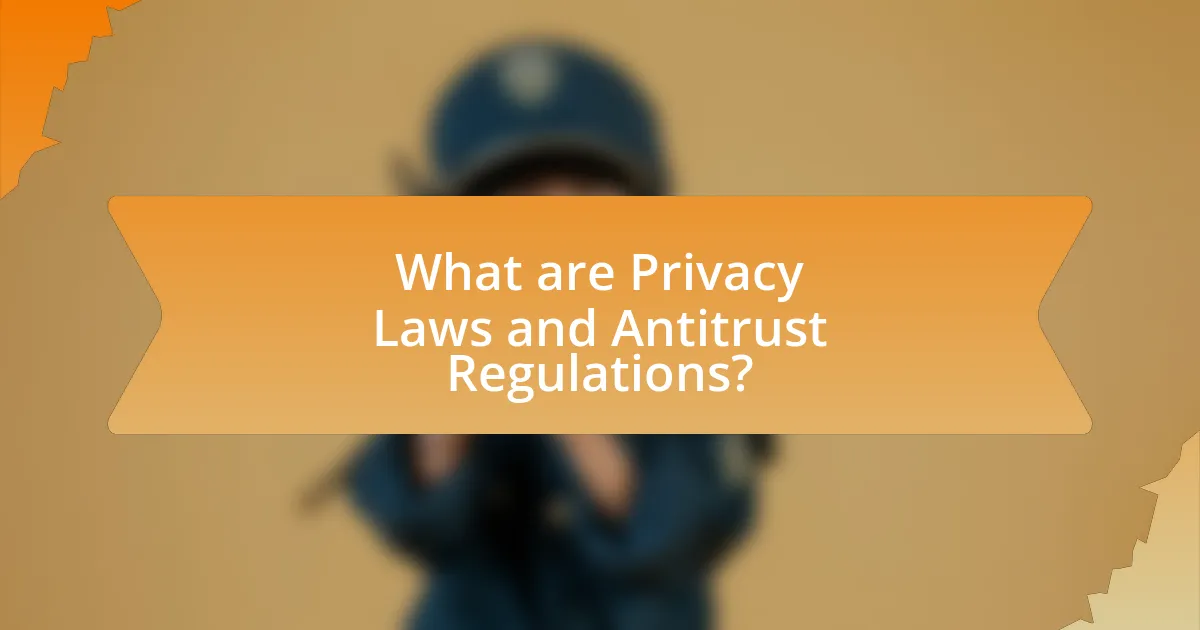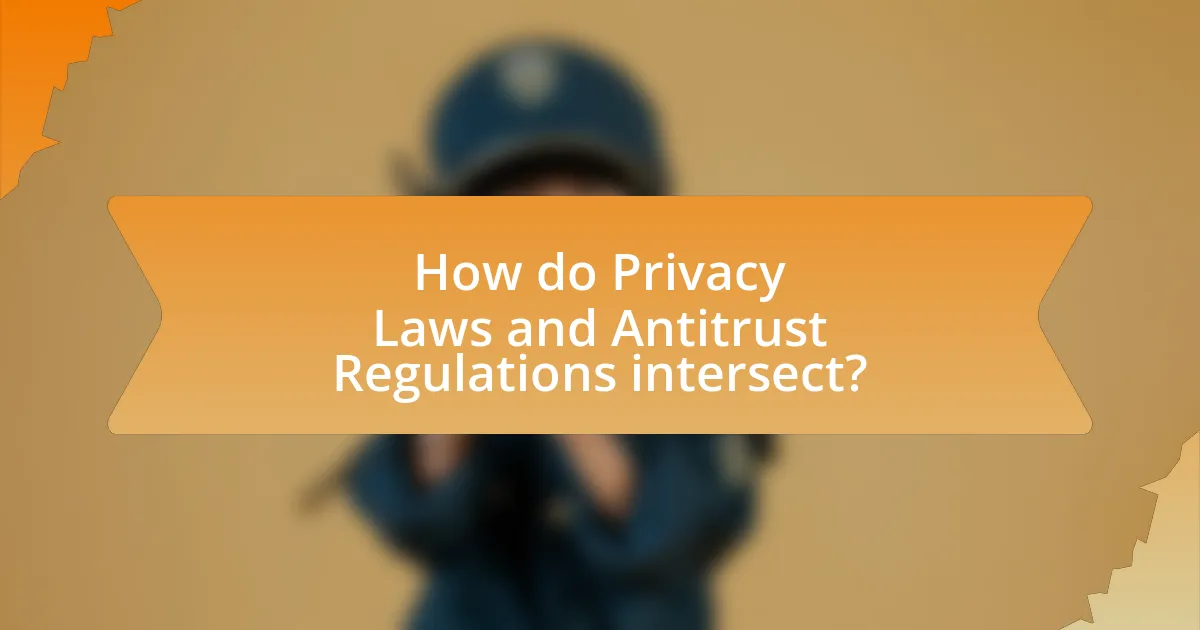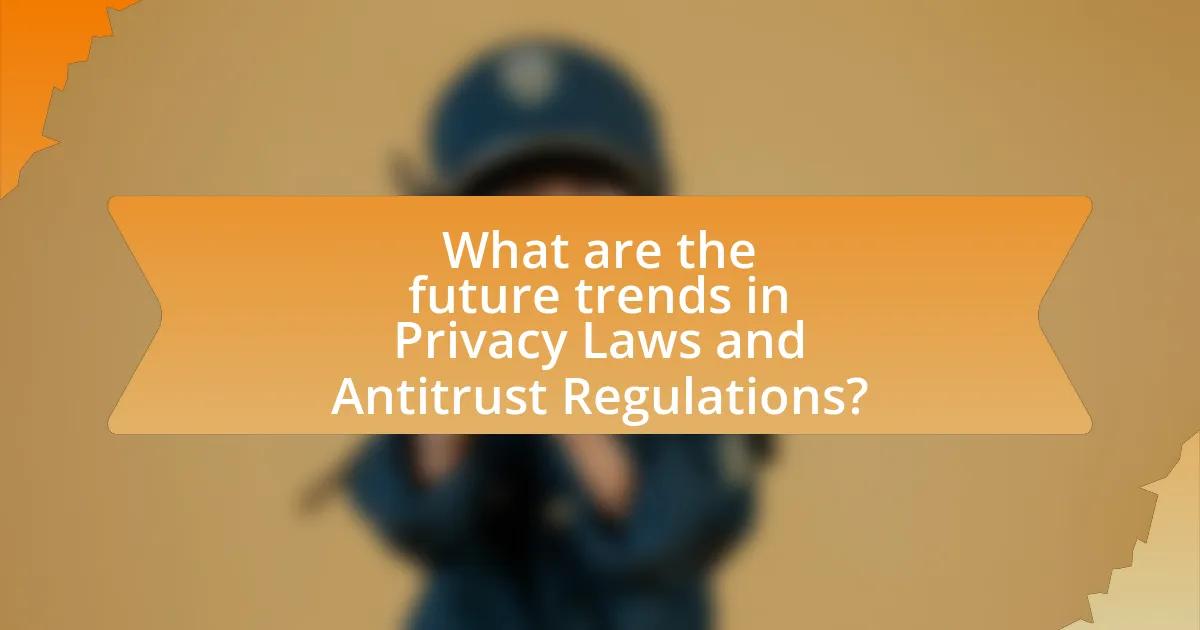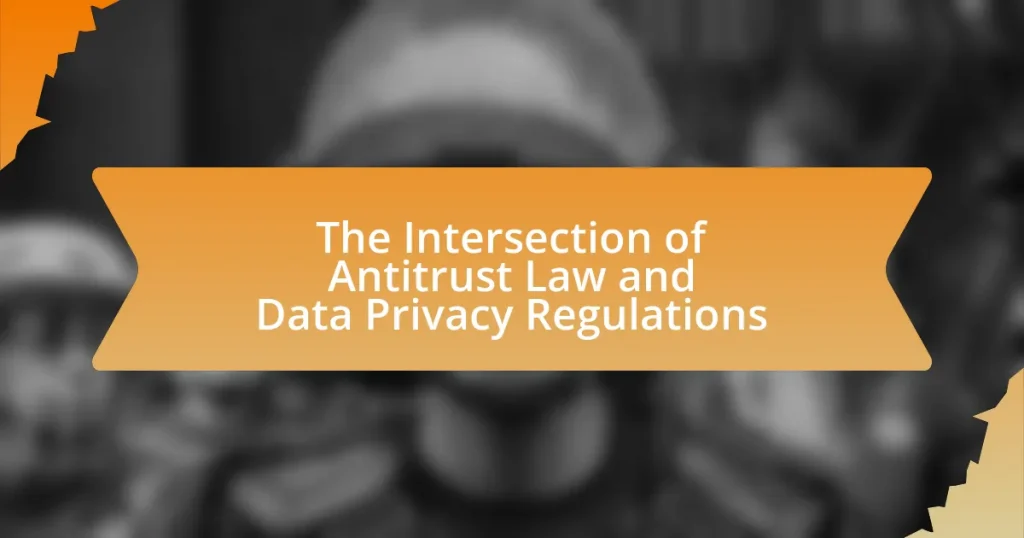The article focuses on the intersection of privacy laws and antitrust regulations, highlighting their significance in protecting individual rights and promoting fair competition in the marketplace. It outlines the key components of privacy laws, such as data protection principles and individual rights, while also detailing the main principles of antitrust regulations aimed at preventing monopolistic practices. The article discusses how these two regulatory areas intersect, the challenges businesses face in navigating conflicting compliance requirements, and the implications for consumer rights. Additionally, it explores future trends, the influence of emerging technologies, and best practices for businesses to ensure compliance with both privacy and antitrust laws.

What are Privacy Laws and Antitrust Regulations?
Privacy laws are regulations that govern the collection, storage, and sharing of personal information to protect individuals’ privacy rights. These laws, such as the General Data Protection Regulation (GDPR) in the European Union, impose strict requirements on organizations regarding how they handle personal data, including obtaining consent and ensuring data security.
Antitrust regulations, on the other hand, are laws designed to promote competition and prevent monopolistic practices in the marketplace. These regulations, such as the Sherman Act in the United States, prohibit anti-competitive agreements and abuse of market power to ensure fair competition and protect consumers.
Both privacy laws and antitrust regulations are essential for maintaining a balance between individual rights and market competition, as they address different aspects of how businesses operate in relation to consumers and their data.
How do Privacy Laws protect individual rights?
Privacy laws protect individual rights by establishing legal frameworks that govern the collection, use, and dissemination of personal information. These laws, such as the General Data Protection Regulation (GDPR) in Europe and the California Consumer Privacy Act (CCPA) in the United States, grant individuals rights such as the right to access their data, the right to have their data deleted, and the right to consent to data processing. For instance, the GDPR mandates that organizations must obtain explicit consent from individuals before processing their personal data, thereby empowering individuals to control their own information. This legal structure not only safeguards personal privacy but also imposes penalties on organizations that fail to comply, reinforcing the importance of individual rights in the digital age.
What are the key components of Privacy Laws?
The key components of Privacy Laws include data protection principles, individual rights, compliance obligations, and enforcement mechanisms. Data protection principles establish guidelines for the collection, use, and storage of personal information, ensuring that data is processed lawfully and transparently. Individual rights grant individuals control over their personal data, including rights to access, rectify, and erase their information. Compliance obligations require organizations to implement measures to protect personal data and report breaches. Enforcement mechanisms provide authorities with the power to investigate violations and impose penalties, ensuring adherence to privacy regulations. These components collectively aim to safeguard personal information and uphold individuals’ privacy rights in various jurisdictions.
How do Privacy Laws vary across different jurisdictions?
Privacy laws vary significantly across different jurisdictions, reflecting diverse cultural, legal, and regulatory frameworks. For instance, the European Union’s General Data Protection Regulation (GDPR) imposes strict requirements on data processing and grants individuals extensive rights over their personal data, while the United States adopts a more sectoral approach, with laws like the California Consumer Privacy Act (CCPA) focusing on specific industries rather than a comprehensive framework. Additionally, countries like Brazil have enacted their own privacy laws, such as the Lei Geral de Proteção de Dados (LGPD), which aligns closely with the GDPR but incorporates unique local provisions. These variations illustrate how different legal systems prioritize privacy and data protection based on their societal values and economic contexts.
What is the purpose of Antitrust Regulations?
The purpose of antitrust regulations is to promote fair competition and prevent monopolistic practices in the marketplace. These regulations aim to protect consumers by ensuring that no single entity can dominate a market to the detriment of competition, which can lead to higher prices, reduced quality, and less innovation. For instance, the Sherman Act of 1890 established the foundation for antitrust laws in the United States, making it illegal to restrain trade or commerce and to attempt to monopolize any part of the trade or commerce. This historical context underscores the importance of maintaining competitive markets for the benefit of consumers and the economy.
What are the main principles of Antitrust Regulations?
The main principles of Antitrust Regulations include promoting competition, preventing monopolies, and protecting consumer welfare. These regulations aim to ensure that no single entity can dominate a market to the detriment of competitors and consumers. For instance, the Sherman Act of 1890 prohibits contracts, combinations, or conspiracies that restrain trade, while the Clayton Act of 1914 addresses specific practices like price discrimination and exclusive dealings that may harm competition. These laws are enforced by agencies such as the Federal Trade Commission and the Department of Justice, which investigate and take action against anti-competitive practices to maintain a fair marketplace.
How do Antitrust Regulations promote competition?
Antitrust regulations promote competition by preventing monopolistic practices and ensuring a level playing field for businesses. These regulations, enforced by government agencies, prohibit actions such as price-fixing, market allocation, and other anti-competitive behaviors that can stifle competition. For instance, the Sherman Act of 1890 and the Clayton Act of 1914 in the United States serve as foundational laws that aim to dismantle monopolies and promote market entry for new competitors. By maintaining competitive markets, antitrust regulations encourage innovation, lower prices, and improve consumer choice, ultimately benefiting the economy as a whole.

How do Privacy Laws and Antitrust Regulations intersect?
Privacy laws and antitrust regulations intersect primarily through the control of data and market competition. Privacy laws, such as the General Data Protection Regulation (GDPR), impose restrictions on how companies collect, store, and use personal data, while antitrust regulations aim to prevent anti-competitive practices and promote market fairness. For instance, companies that dominate a market may exploit consumer data in ways that violate privacy laws, leading to scrutiny from regulatory bodies. Additionally, the enforcement of privacy laws can impact market dynamics by limiting data access for competitors, which can raise antitrust concerns. This intersection is increasingly relevant as regulators worldwide seek to balance consumer privacy with competitive market practices, highlighting the need for cohesive legal frameworks that address both areas simultaneously.
What challenges arise from the intersection of these two areas?
The challenges arising from the intersection of privacy laws and antitrust regulations include conflicting compliance requirements and the potential for regulatory overlap. Companies must navigate the complexities of adhering to stringent data protection standards while also ensuring competitive practices, which can lead to legal ambiguities. For instance, the General Data Protection Regulation (GDPR) imposes strict rules on data usage, while antitrust laws may require data sharing to promote competition. This duality can create friction, as businesses may struggle to balance consumer privacy with the need for transparency in competitive practices, leading to increased legal risks and operational costs.
How do conflicting objectives impact businesses?
Conflicting objectives impact businesses by creating challenges in decision-making and resource allocation. When companies face competing priorities, such as compliance with privacy laws versus adherence to antitrust regulations, they may struggle to balance these demands effectively. For instance, a business might prioritize user data protection to comply with privacy laws, which could limit its ability to engage in competitive practices that enhance market position. This tension can lead to increased operational costs, potential legal penalties, and a negative impact on reputation. According to a report by the International Association of Privacy Professionals, 70% of organizations experience difficulties in aligning privacy and competition strategies, highlighting the significant operational challenges posed by conflicting objectives.
What legal cases illustrate this intersection?
Legal cases that illustrate the intersection of privacy laws and antitrust regulations include the Federal Trade Commission v. Facebook, Inc. and the European Commission’s antitrust case against Google. In the FTC v. Facebook case, the agency alleged that Facebook’s data practices violated consumer privacy and constituted anti-competitive behavior by stifling competition through acquisitions of potential rivals. The European Commission’s case against Google involved accusations of abusing its dominant market position while also infringing on privacy regulations by collecting and using personal data without adequate consent. These cases demonstrate how privacy concerns can overlap with antitrust issues, highlighting the need for regulatory frameworks that address both areas simultaneously.
Why is it important to understand this intersection?
Understanding the intersection of privacy laws and antitrust regulations is crucial because it shapes how businesses operate in a digital economy while safeguarding consumer rights. This intersection influences regulatory frameworks that govern data protection and market competition, ensuring that companies do not exploit personal data to gain unfair advantages. For instance, the European Union’s General Data Protection Regulation (GDPR) and the Digital Markets Act (DMA) highlight the need for compliance with both privacy and competition standards, demonstrating that a failure to navigate this intersection can lead to significant legal repercussions and financial penalties for businesses.
How does this intersection affect consumer rights?
The intersection of privacy laws and antitrust regulations significantly affects consumer rights by enhancing protections against data misuse while promoting fair competition. Privacy laws, such as the General Data Protection Regulation (GDPR), empower consumers with rights over their personal data, including the right to access, rectify, and delete information. Concurrently, antitrust regulations aim to prevent monopolistic practices that can harm consumers by limiting choices and inflating prices. For instance, the Federal Trade Commission (FTC) enforces antitrust laws to ensure that companies do not engage in unfair practices that could exploit consumer data for competitive advantage. This dual framework ensures that consumers not only have control over their personal information but also benefit from a competitive marketplace that discourages exploitation and promotes innovation.
What implications does it have for businesses and regulators?
The intersection of privacy laws and antitrust regulations has significant implications for businesses and regulators. Businesses must navigate increased compliance requirements, as stricter privacy laws can lead to higher operational costs and necessitate changes in data handling practices. For instance, the General Data Protection Regulation (GDPR) imposes hefty fines for non-compliance, compelling companies to invest in robust data protection measures.
Regulators face the challenge of balancing consumer privacy with market competition. They must ensure that privacy regulations do not stifle innovation or create barriers to entry for smaller firms. The Federal Trade Commission (FTC) has emphasized the need for a cohesive framework that addresses both privacy and competition, indicating that overlapping regulations could lead to confusion and inefficiencies in enforcement.
Overall, the convergence of these regulatory areas requires businesses to adopt a proactive approach to compliance while regulators must develop clear guidelines that harmonize privacy and antitrust objectives.

What are the future trends in Privacy Laws and Antitrust Regulations?
Future trends in privacy laws and antitrust regulations indicate a growing convergence, emphasizing the protection of consumer data while promoting fair competition. As governments worldwide, particularly in the European Union and the United States, enhance privacy frameworks like the General Data Protection Regulation (GDPR) and the California Consumer Privacy Act (CCPA), they are increasingly scrutinizing how data practices impact market competition. For instance, the Federal Trade Commission (FTC) has signaled intentions to enforce stricter regulations on data privacy that could influence antitrust assessments, particularly regarding large tech companies. This trend is supported by recent legislative proposals aimed at integrating privacy considerations into antitrust evaluations, reflecting a shift towards a holistic approach that balances consumer protection with competitive market dynamics.
How are emerging technologies influencing these regulations?
Emerging technologies are significantly influencing privacy laws and antitrust regulations by necessitating updates to existing frameworks to address new challenges and opportunities. For instance, the rise of artificial intelligence and big data analytics has prompted regulators to reconsider how personal data is collected, processed, and shared, leading to stricter data protection measures like the General Data Protection Regulation (GDPR) in Europe. Additionally, the increasing use of digital platforms has raised concerns about market dominance and anti-competitive practices, prompting regulatory bodies to explore new antitrust laws that specifically target tech giants. These developments illustrate how technological advancements are driving regulatory evolution to ensure consumer protection and fair competition in a rapidly changing digital landscape.
What role does data privacy play in shaping Antitrust actions?
Data privacy significantly influences antitrust actions by shaping regulatory frameworks that address market competition and consumer protection. As companies increasingly rely on data collection and usage, regulators assess whether such practices create unfair competitive advantages or harm consumer interests. For instance, the European Union’s General Data Protection Regulation (GDPR) has prompted scrutiny of how data practices can lead to monopolistic behaviors, as seen in cases against major tech firms like Google and Facebook. These actions illustrate the growing recognition that data privacy is not only a consumer right but also a critical factor in maintaining fair competition in the marketplace.
How might regulatory frameworks evolve in response to technological advancements?
Regulatory frameworks are likely to evolve by becoming more adaptive and responsive to the rapid pace of technological advancements. As technologies such as artificial intelligence, blockchain, and data analytics continue to develop, regulators will need to implement more flexible and dynamic policies that can address emerging challenges related to privacy, competition, and consumer protection. For instance, the General Data Protection Regulation (GDPR) in Europe has already set a precedent for stringent data privacy laws, prompting other jurisdictions to consider similar frameworks that can accommodate new technologies while safeguarding individual rights. Additionally, antitrust regulations may be revised to address the monopolistic tendencies of tech giants, as seen in recent investigations into companies like Google and Facebook, which have raised concerns about market dominance and consumer choice. These examples illustrate how regulatory frameworks are evolving to keep pace with technological changes and ensure that they remain relevant and effective in protecting public interests.
What best practices can businesses adopt to navigate these regulations?
Businesses can adopt several best practices to navigate privacy laws and antitrust regulations effectively. First, they should implement comprehensive compliance programs that include regular audits to assess adherence to both privacy and antitrust laws. For instance, the General Data Protection Regulation (GDPR) mandates strict data handling practices, while antitrust laws require fair competition; thus, businesses must ensure their data practices do not inadvertently stifle competition.
Second, organizations should invest in employee training focused on both privacy and antitrust issues, ensuring that all staff understand the legal implications of their actions. Research indicates that companies with robust training programs experience fewer compliance violations.
Third, businesses should engage legal counsel specializing in both areas to conduct risk assessments and provide guidance on best practices. This dual approach helps identify potential conflicts between privacy and competition laws, allowing for proactive adjustments.
Lastly, maintaining transparency with consumers about data usage and competitive practices fosters trust and can mitigate regulatory scrutiny. According to a study by the International Association of Privacy Professionals, transparency is linked to higher consumer confidence, which can benefit businesses in the long run.
How can companies ensure compliance with both Privacy Laws and Antitrust Regulations?
Companies can ensure compliance with both Privacy Laws and Antitrust Regulations by implementing a comprehensive compliance program that integrates data protection and competition law principles. This involves conducting regular audits to assess data handling practices and market behavior, ensuring transparency in data collection and usage, and fostering a culture of compliance through training and awareness programs.
For instance, the General Data Protection Regulation (GDPR) mandates strict data handling protocols, while antitrust laws require fair competition practices. Companies must align their data management strategies with these regulations to avoid conflicts. A study by the International Association of Privacy Professionals (IAPP) highlights that organizations with integrated compliance frameworks are better positioned to navigate the complexities of overlapping legal requirements.
What strategies can businesses implement to balance privacy and competition concerns?
Businesses can implement data minimization, transparency, and compliance with privacy regulations as strategies to balance privacy and competition concerns. Data minimization involves collecting only the necessary information from consumers, which reduces privacy risks while still allowing businesses to compete effectively. Transparency in data usage fosters trust and can enhance customer loyalty, providing a competitive edge. Compliance with privacy regulations, such as the General Data Protection Regulation (GDPR), not only mitigates legal risks but also positions businesses as responsible entities in the marketplace, which can attract privacy-conscious consumers. These strategies collectively enable businesses to navigate the complexities of privacy laws and antitrust regulations while maintaining competitive viability.


